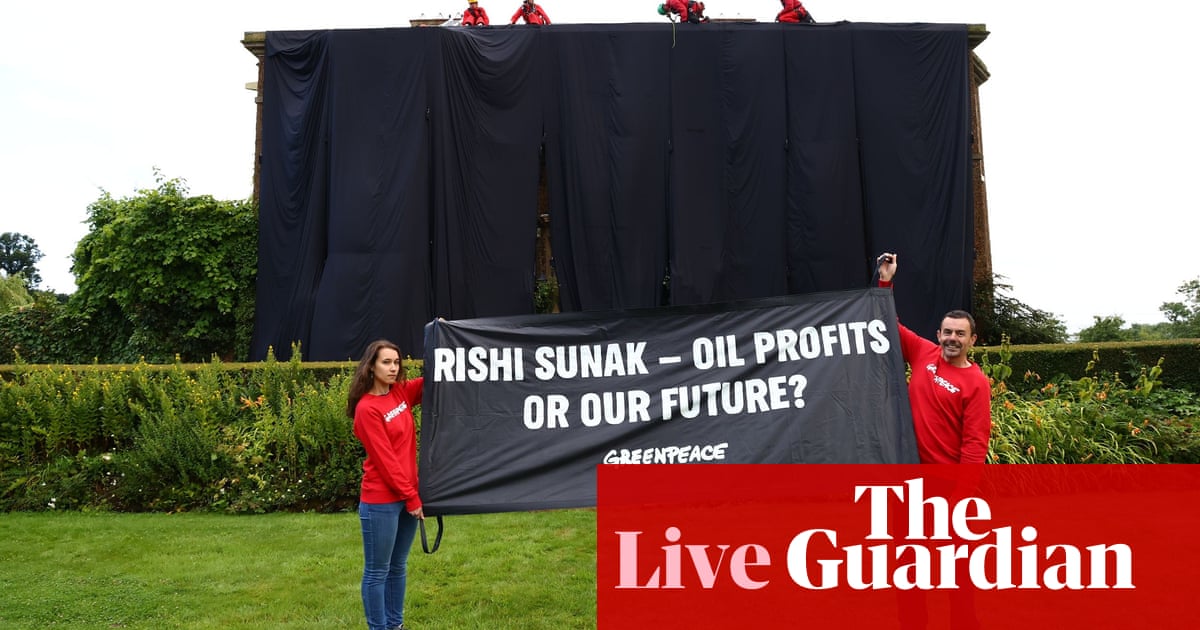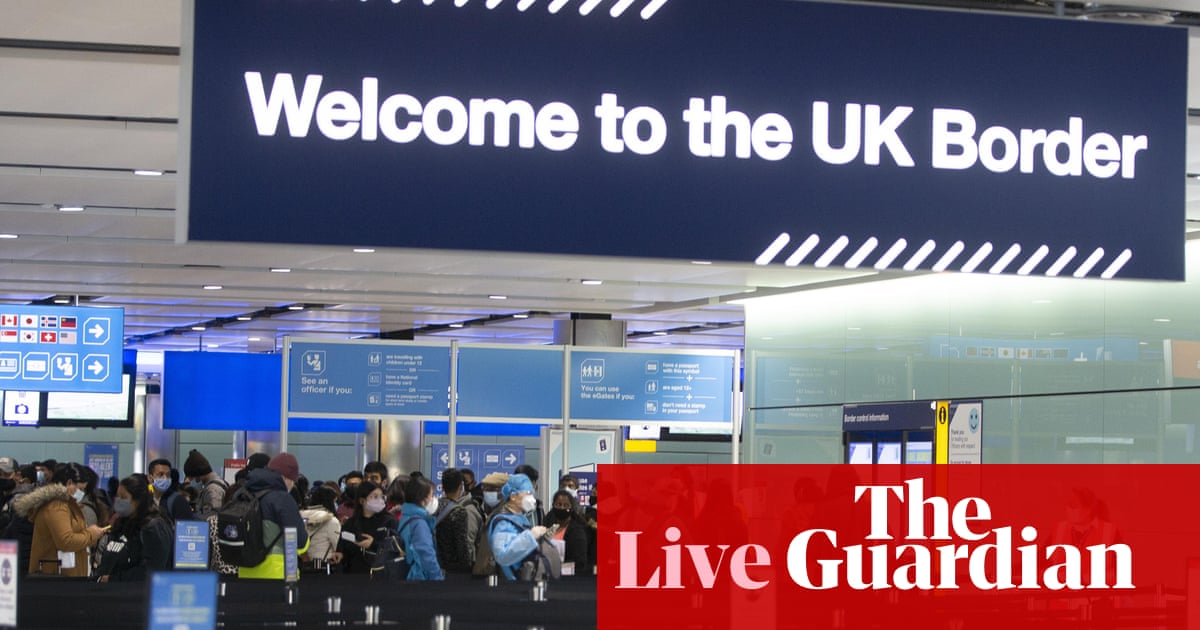
Shadow foreign secretary Andrew Mitchell says Cleverly and Cameron would never have agreed this deal
Andrew Mitchell, the shadow foreign secretary, says it is astonishing the government is giving away a military asset to a country than never had it before.
He quotes approvingly what the Times said about the deal in an editorial. It said:
In a dangerous world Britain’s security is being risked by ministers and departmental lawyers who believe appeasing faux anti-colonialist sentiment in the UN matters more than the national interest.
He says James Cleverly and Lord Cameron would never have agreed this deal. If they had been willing to strike this deal, it would have been agreed years ago.
He says he has five questions.
1) What are the implications for the Falkland Islands and Gibraltar?
2) What are the implications for sovereign military bases on Cyprus?
3) What are the assurances about China not deploying armed forces on the islands? He says Lammy’s words today are welcome, but he points out that the treaty has not been published.
4) How much is being paid?
5) What consultation has there been with Chagossians?
Early evening summary
David Lammy, the foreign secretary, has said that the deal giving the Chagos Island to Mauritius will protect relations with the US. Speaking in the Commons, he said:
Inaction posed several acute risks to the United Kingdom. First, it threatened the UK-US base from countering malign Iranian activity in the Middle East to ensuring a free and open Indo-Pacific.
It’s critical for our national security. Without surety of tenure, no base can operate effectively nor truly deter our enemies. Critical investment decisions were already being delayed.
Second, it impacted on our relationship with the United States who neither wanted nor welcomed the legal uncertainty and strongly encouraged us to strike a deal. I am a trans-Atlanticist. We had to protect this important relationship.
And third, it undermined our international standing where showing what we mean is what we say on international law and our desire for partnerships with the Global South. This strengthens our arguments when it comes to issues like Ukraine or the South China Sea.
Keir Starmer has told MPs that stopping all arms sales to Israel will “never” be his position. Speaking in the Commons, he said:
If sale of weapons for defensive use by Israel were banned, that is a position that I could not countenance a year after October the 7th. It is not a position I could countenance in the face of attacks by Iran.
The whole House saw the number of missiles coming over into Israel only the other day, and the idea that we could say we support Israel’s right to defend herself, and at the same time deprive her of the means to do so, is so wholly inconsistent that it will never be my position.
John Healey, the defence secretary, has denied that No 10 is at a crisis point despite the prime minister’s chief of staff leaving her post less than 100 days into the new Labour government.
Rachel Reeves has decided not to raise tax on pensions contributions in this month’s budget, after public sector unions warned that doing so would hurt their members.
Mark Francois (Con) asks how much the UK will pay in rent to lease back something “already ours”.
Lammy says, when the treaty is published, there will be a discussion of the cost. It is not having a deal that would damage national security, he says.
Mel Stride, the former work and pensions secretary, who was knocked out of the Tory leadership contest in the last round of voting by MPs, is backing James Cleverly, Lucy Fisher from the Financial Times reports.
Robert Jenrick, another Tory leadership candidate, says the UK has handed a sovereign island to an ally of China, just so Lammy can feel good at London dinner parties.
Lammy says he hopes that has secured Jenrick a few more votes in the Tory leadership contest. But the US president and the US secretary of state are in favour. He suggests they know more about foreign policy than Jenrick.
Tom Tugendhat, the Tory leadership candidate, says Lammy has made this deal even though it is not based on the views of Chagossians, and because he is elevating the views of an international court over the national interest. He says both of those features set a bad precedent for people on the Falkland Islands.
Farage suggests Donald Trump won"t back Chagos Islands deal if elected president
Nigel Farage, the Reform UK leader, accuses Lammy of caring more about the judgment of a foreign court than about national sovereignty. And he says, althought President Biden may approve of this deal, Donald Trump might not.
Lammy says the UK has taken views across the US political establishment. But he says the president, the secretary of state and the US defence secretary have all welcomed this. That should assure Farage that this will not help the Chinese, he says.
Iain Duncan Smith, the former Tory leader, said the government agreed this deal to help a “disgusting” Mauritian government ahead of an election. He also accuses Mauritius of being pro-China.
Lammy said he did not agree with what Duncan Smith said about a fellow Commonwealth country.
Andrew Rosindell (Con) said this was a dark day for British democracy. He said the government should allow the Chagossians the right to self-determination.
Calum Miller, a Lib Dem foreign affairs spokesperson, says he is concerned that the Chagossians were not consulted over this deal.
He says there is no equivalence between the Chagos Islands and other overseas territories. And he says the Tories who have suggested there is play into the hands of Britain’s enemies.
Lammy says Miller is right to raise the interest of Chagossians. They were they were treated in the 1960s was wrong. This was a negotiation between two sovereign governments, he says. But he says they were kept informed as to what was happening.
Lammy is responding to Mitchell. He accuses him of having some “brass neck” in opposing a deal sought by the last Tory government.
He says, if the security concerns Mitchell raised were well-founded, Washington would not have welcomed it.
The future of Diego Garcia has been secured, he says.
Referring to the Tories, he says:
They posture, we lead.
And he says of course the Chagossians were kept informed about how the negotiations were going.
Shadow foreign secretary Andrew Mitchell says Cleverly and Cameron would never have agreed this deal
Andrew Mitchell, the shadow foreign secretary, says it is astonishing the government is giving away a military asset to a country than never had it before.
He quotes approvingly what the Times said about the deal in an editorial. It said:
In a dangerous world Britain’s security is being risked by ministers and departmental lawyers who believe appeasing faux anti-colonialist sentiment in the UN matters more than the national interest.
He says James Cleverly and Lord Cameron would never have agreed this deal. If they had been willing to strike this deal, it would have been agreed years ago.
He says he has five questions.
1) What are the implications for the Falkland Islands and Gibraltar?
2) What are the implications for sovereign military bases on Cyprus?
3) What are the assurances about China not deploying armed forces on the islands? He says Lammy’s words today are welcome, but he points out that the treaty has not been published.
4) How much is being paid?
5) What consultation has there been with Chagossians?
Lammy says foreign armed forces will not be allowed to base themselves on other Chagos Islands under deal
Lammy says the Diego Garcia base now has an uncontested legal basis long into the future.
It will have delegated sovereignty for at least 99 years, with an option to extend.
And he says the deal will stop foreign armed forces [he means China, but does not name it] basing themselves on the other Chagos Islands, which are currently unoccupied.
Lammy says there is also a financial settlement acceptable to both sides.
He says this deal does not affect Gibraltar or the Falkland Islands, which are very different.
He says the government hopes to ratify this treaty in 2025.
David Lammy tells MPs that failure to strike deal over Chagos Islands would have damaged relations with US
Lammy says it took two years of negotiations to reach the agreement with Mauritius on the Chagos Islands.
He says the status quo was not sustainable. The UK was likely to lose a binding option.
It would have then had to abandon the military base at Diego Garcia, or break international law.
Doing the deal on UK terms will allow the operation of the base to continue, he says.
He says James Cleverly, the former foreign secretary, initiated these talks. And Lord Cameron, Cleverly’s successor, ultimately allowed those talks to go ahead.
Inaction posed a threat to the Diego Garcia military base, which is “critical” for national security, he says.
Second, inaction would have impacted on relations with the US. They did not like uncertainty, and wanted a deal.
And, third, inaction undermined the UK’s international standing. This deal shows the UK respects international law, he says. That backs its position on issues like Ukraine, he says.
Commons Speaker Lindsay Hoyle criticises government for announcing Chagos Islands deal towards end of recess
Keir Starmer’s statement is over. David Lammy, the foreign secretary, is now making a statement about the decision to return the Chagos Islands to Mauritius.
Lindsay Hoyle, the Speaker, says while government business continues during recess, it is frustrating when government announcements are made towards the end of recess.
He says it would have been better if Lammy had delayed this announcement, made on Thursday last week, until today. Then they could have learned about it in the Commons.
He says the argument that announcements have to be made in recess because of elections in other parts of the world is irrelevant to him. (The UK government wanted to to finalise the deal before the forthcoming Mauritian elections.) Hoyle says he is concerned about the interests of MPs in Britain.
Back in the Commons, the independent MP Ayoub Khan, who was elected largely because of his pro-Palestinian stance, asked Keir Starmer if he was telling MPs that the UK would not be selling arms to Israel that could be used offensively. He was referring to Starmer telling Richard Burgon he would not support an arms embargo that deprived Israel of weapons it needed to protect itself (see 4.18am), a line he subsequently repeated to Zarah Sultana.
In response, Starmer avoided the thrust of the question. Instead he said that the government was following the process set down in law, and that it had published the reasons for its recent decision.
Michelle O"Neill says she"s "appalled" Sinn Féin press officers gave job references for ex-colleague under investigation for child sex offences
Michelle O’Neill, the Sinn Féin first minister of Northern Ireland, has said she was “absolutely appalled and horrified” that two press officers in her party gave work references to a former colleague who was being investigated over child sex offences.
She described Michael McMonagle, who is now awaiting sentencing, as a “monster” whose actions were “utterly reprehensible”.
But she insisted she had not been made aware until 24 September that two press officers had given employment references to the British Heart Foundation where McMonagle worked as a press official after being suspended from Sinn Féin. She said:
I am absolutely appalled and horrified that that occurred.
These references were given without the knowledge or authorisation of the party, and under no circumstances would the party have provided a reference for work or for otherwise for McMonagle.
Apologising for the hurt and distress caused by the affair, O’Neill set out the timeline in a bid to draw a line under the scandal which has dogged the party for the past week.
Matthew O’Toole, the SDLP leader in the Northern Ireland assembly, said the party did not show the “candour and transparency” expected of all politicians.
Under universal credit (UC), a new benefit originally introduced by the coalition government, people have to wait around five weeks to get their first payment. In response to claims that people would be without money for more than a month, the government allowed claimaints to get an advance payment, repaid interest-free through monthly deducations when proper payments start.
A DWP report published today by Liz Kendall says that the most vulnerable claimants are most likely not to understand the support available. The report, which is based on in-depth interviews with claimants, says:
Those with a disability or long-term health condition or who had difficult personal circumstances, such as being a refugee or leaving an abusive relationship were likely to need support to understand the transition to UC, the advance payment and to manage their finances but were unlikely to seek this out themselves.
And some of the claimants did not get this information from jobcentres, it says.
There were claimants who did not remember being told about the advance payment until after they had made their claim or reached the end of their first assessment period. This may have been because of poor recall or there may be inconsistencies in the information being provided at jobcentres.
The report suggests it would be better if claimants attending a jobcentre were given written, personalised information about how much they would get from an advance payment, and how they would pay it back.












